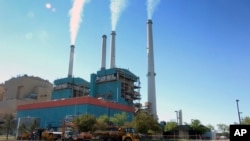The Trump administration is advancing a proposal for electric utilities that would supplant President Barack Obama's principal attempt to curtail U.S. contributions to global warming, with a new rule that's expected to go easier on the coal industry.
The Environmental Protection Agency disclosed Tuesday that it sent the new rule the White House for review. The document itself was not released, but President Donald Trump has been outspoken in his desire to prop up the ailing coal industry by rolling back what he considers burdensome regulations.
Burning coal to generate electricity is one of the primary sources of greenhouse gases blamed for climate change.
The submission of the rule to the White House on Monday coincided with former coal industry lobbyist Andrew Wheeler taking the helm of the EPA, following last week's resignation of Administrator Scott Pruitt amid multiple ethics scandals.
It also comes amid a global heat wave that's seen record-breaking temperatures across portions of the Northern Hemisphere.
Wheeler, like Pruitt, has expressed skepticism about the extent to which coal, oil and gas emissions drive climate change, something mainstream science says is indisputable fact.
Paul Wapner with American University in Washington, D.C., said Trump appears intent on dismantling the anchor-piece of Obama's domestic response to climate change, after already reversing Obama's biggest international achievement on that front by pulling the U.S. out of the Paris climate accord.
``You remove those two pieces and basically the U.S. doesn't have a climate plan,'' said Wapner, a professor of global environmental politics. ``It opens the door for other countries now to cut back on their own domestic efforts. This will certainly provide an excuse if another country is looking for it.''
EPA spokeswoman Molly Block said in a statement that the agency intends to move expeditiously on the replacement rule. She did not provide a timeline.
The EPA said it would seek public comment on the matter only after the White House review is completed.
Obama plan
Nearly 200 countries have committed to combat global warming by reducing carbon dioxide and other greenhouse gases that contribute to global warming.
Obama sought to cut U.S. carbon dioxide emissions to 32 percent below 2005 levels by 2030, largely by reducing pollution from coal-fired power plants. The emission cuts also were expected to improve public health by eliminating 90,000 asthma attacks and up to 3,600 premature deaths a year.
Under Trump, the EPA declared last year that the old rule exceeded federal law by setting emissions standards that power plants could not reasonably meet. In December, the agency announced it would craft a replacement plan to limit greenhouse gas emissions from the electric utility sector.
The U.S. Supreme Court had put Obama's plan on hold in 2016 following a legal challenge by industry and coal-friendly states.
Nevertheless the Obama plan helped drive a wave of retirements of coal-fired plants, which also have been squeezed by competition from cheap natural gas and renewable power and energy conservation mandates adopted by many states.





